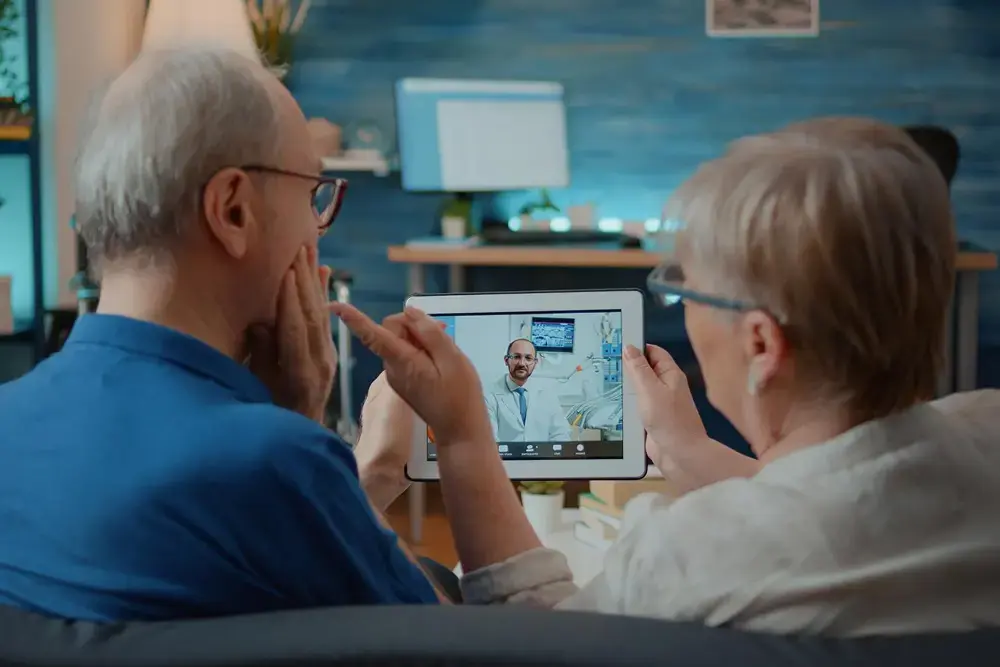Did you know that the patient portals market was valued at $3.92 billion in 2024 and is now expected to reach $8.38 billion by 2030? The hospital segment held over 40% of the market share in 2024. The widespread market...
The increasing demand for healthcare services underscores the critical need for medical practitioners to automate administrative processes such as appointment booking and medical billing.
A recent American Medical Association (AMA) study found that medical professionals in the United States spend an average of 15 hours per week on administrative tasks, the time that could have been spent on patient care. This manual workload hampers patient interactions and ultimately leads to an average of 20% of medical claims being initially denied by the insurance companies due to errors, exacerbating financial strains, and compromising patient care. Furthermore, the Institute for Healthcare Improvement reported that administrative errors contribute to up to 50% of medical errors, highlighting the need for and pivotal role of administrative automation in patient safety.
The COVID-19 pandemic accentuated these challenges, with an estimated 1.5 million healthcare job losses in the initial months and ongoing staffing shortages. As healthcare practices grappled with the pandemic's impact, implementing technology solutions became paramount.
For instance, a New York-based multispecialty clinic witnessed significant improvements after adopting an integrated electronic health record system (EHR Solutions), reducing denied claims by 40% and appointment scheduling errors by 30%. This success story underscores the potential of automation, primarily via integrated and Cloud-based EHR to alleviate administrative burdens, enhance patient experiences, streamline financial processes, and empower medical practitioners to prioritize what matters most: patient-centered care.
How can Automation Ease the Crisis?
Attending to patients and providing medical care is the main priority of medical practices. And yet, due to growing staffing issues, practices are inundated by administrative tasks with very little time to complete them. From scheduling appointments to filing insurance claims, admin tasks cut into the available time for providing quality medical care to a growing patient population.
The primary function of medical practice management software is to provide additional support for medical practices and healthcare practitioners, whether a small business or a hospital setup. Electronic medical records (EHR) solutions automate the management and transmission of patient data to streamline operations, improve productivity, and increase allocated time spent providing attentive medical care to patients.
The Benefits of Automation
There are benefits in every aspect when it comes to deploying automated healthcare practice management software. These include:
- Enhanced data access and management
- Increased patient satisfaction
- Lower overheads and costs
- Simplified scheduling
- Enhanced privacy
- Reduced errors
- Medical practice management software uses
- Medical practice management software has many uses to help streamline and simplify admin tasks.
What tasks can I automate using EHR Solutions?
Appointment scheduling
One of the many uses of medical practice management software with integrated EHR includes appointment scheduling to save time and significantly reduce patient no-shows. With integrated patient portals, patients gain greater autonomy over their health appointments with the option to schedule, change, or cancel appointments at the push of a button. Automated appointment reminders help to save even more time by streamlining correspondence and reducing the practice’s workload.
Validate, process, and track
Medical practice management software is designed to simplify claims validation, processing, and tracking to help improve the productivity of front desk staff. These stages take the most time in administrative tasks; by automating these three stages of the claims process, practices reduce the potential for error and drastically reduce time spent on administration tasks.
Automated Patient Validation
Validating patient eligibility is a tedious process that consumes much time. Automated validation systems can potentially increase staff efficiency and practice profitability with comprehensive electronic eligibility verification systems. The best medical practice management software automatically runs eligibility checks before appointments to ensure the practice is paid for its services.
Eliminating the need for healthcare providers and practices to check insurance coverage, automated eligibility verification puts vital data at your fingertips.
Process
Medical practice management software automates claim editing and processing, thereby reducing the number of denials resulting from coding errors, incomplete codes, missing modifiers, or information to support reporting drugs.
This means automating plan-specific edits to reduce the number of denials for coding-related issues and automating the creation of supporting documents sent with the claim. The best and most effective healthcare practice management software flags false charges for review to speed up the submission process. With EOB details automatically linked to the individual mandate within the follow-up workflow, these softwares ensures that the correct information is immediately available to resolve denials.
Tracking Claims
The best medical practice management software reduces A/R delays by automating and monitoring the claims process from start to finish. With built-in automation that monitors the status of each claim, EHR Solutions streamlines the medical billing workflow by loading ERAs, stripping denials, and redirecting them to a resolution workflow for immediate attention.
Payment plans
Integrated EHR software often incorporates medical billing software systems that can create and adjust payment plans. With intuitive workflows, adjusting balances, transferring transactions, and automating routine billing tasks are simple.
Acting as a web-based medical billing software, cloud-based EHR software enables faster payments, with less work, at a lower cost. With comprehensive revenue cycle management, medical practice management software eliminates the worry of delayed payments, automating all billing and revenue tracking processes from start to finish.
Patient statements
The relatively new technology of cloud-based EHR acts almost like a CRM for medical practices with the ability to send patient statements via text and email. Likewise, with automated patient statements, patients can pay through email and text, simplifying the billing system to generate quicker payments than ever before.
Practice EHR: For America’s Best Medical Practices
Every team member has a vital role within a medical practice with various responsibilities. Automation is among the best and most effective ways to improve practice productivity and profitability.
Dedicated to simplifying healthcare, Practice EHR is a comprehensive medical practice management software that automates the most time-consuming tasks and allows medical practitioners to focus on what matters: patient satisfaction.
See for yourself how Practice EHR can simplify all aspects of your medical practice with a platform demonstration. Enabling seamless workflows and intuitive automation features, Practice EHR is The ONE solution to streamline the day-to-day running of your practice.
Schedule a demo today to find out how you can enhance and automate your medical practice.
Topics: Integrated EHR, Small Practice, EHR Solution, New Technology, Cloud-based EHR, Medical Practice Management Software
RECENT POSTS



TOPICS
- EHR Solution (145)
- EHR (82)
- Patient Care (75)
- digital age (75)
- Medical Billing (70)
- Specialty-Specific EHR (68)
- Integrated EHR (59)
- Small Practice (56)
- Technology in Healthcare (53)
- Industry Update (48)
- New Technology (47)
- Medical billing services (43)
- RCM (43)
- EHR Features (40)
- Cloud-based EHR (39)
- Practice EHR News (39)
- Healthcare Office Management (37)
- Kiosk (28)
- ePrescribing (21)
- HIPAA Security (18)
- EMR (12)
- Revenue Cycle Management (12)
- Telemedicine (12)
- Practice Management Software (11)
- Client Favorites (10)
- Practice Automation (10)
- The ONE (10)
- Urgent Care (8)
- MACRA/MIPS (7)
- Patient Portal (6)
- Switching to New EHR (6)
- events (6)
- E-Prescribing (5)
- Product Updates (5)
- TeleVisit (5)
- AI Solutions (4)
- Insider (4)
- Internal Medicine EHR (4)
- MIPS (4)
- Podiatry (4)
- Podiatry EHR (4)
- AI Scribing (3)
- HIPAA (3)
- MIPS Reporting (3)
- Regulatory Updates (3)
- AI scanning (2)
- Billing for Private Practices (2)
- Clearinghouse (2)
- Dermatology EHR (2)
- EHR Scheduling (2)
- Foot and Ankle Care (2)
- Foot and Ankle EHR (2)
- Health records 101 (2)
- Integrated Practice Management (2)
- Medical Credentialing (2)
- Medical Practice Management Software (2)
- Orthopedics EHR (2)
- Patient Check-in Kiosk (2)
- Psychiatry EHR (2)
- Quality of Patient Care (2)
- Reporting Under MIPS (2)
- Risk and Liability in Medical Settings (2)
- Telehealth Platform (2)
- Telehealth Platforms (2)
- What Works Clearinghouse (2)
- AI-powered Medical Billing (1)
- Bariatric EHR (1)
- Behavioral Health Practices (1)
- Billing Communication (1)
- Cardiology EHR (1)
- Cash Flow (1)
- Chiropractic EHR (1)
- Data Security (1)
- Dos and Don'ts (1)
- EHR Guides (1)
- EHR KPIs (1)
- EHR Questions to Ask (1)
- EHR for Chiropractors (1)
- EHR for Chronic Illness (1)
- EMR vs EHR Difference (1)
- ENT EHR (1)
- Eligibility Verification in Medical Billing (1)
- Endocrinology EHR (1)
- Family Medicine (1)
- Family Medicine EHR (1)
- Gastroenterology (1)
- Gastroenterology EHR (1)
- General Surgery EHR (1)
- Geriatrics EHR (1)
- Guides (1)
- Healthcare Compliance Certification (1)
- Healthcare Practice Office Management (1)
- Help Center Videos (1)
- Insurance Reimbursement (1)
- KPI (1)
- Key Performance Indicators (1)
- Lab Processing (1)
- MACRA (1)
- Medical Billing Partner (1)
- Medical Coding Services (1)
- Nephrology EHR (1)
- Neurology EHR (1)
- Pain Management EHR (1)
- Pediatrics EHR (1)
- Physical Therapy EHR (1)
- Practice Cash Flow (1)
- Pulmonology EHR (1)
- Simplify Practice Management (1)
- Staffing in Healthcare (1)
- Switch Medical Billing Providers (1)
- Urgent Care Medical Billing (1)
- Urology EHR (1)
- insurance claim denials (1)







